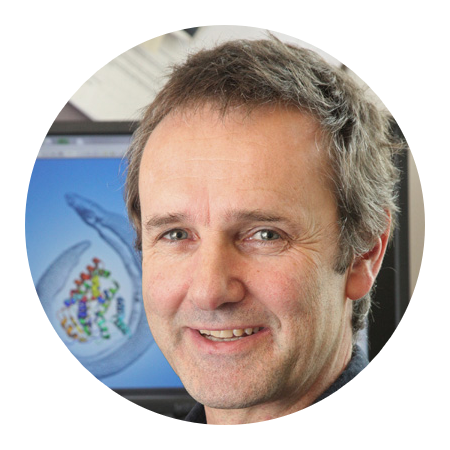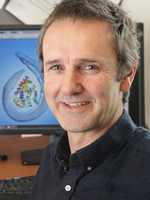
SAN ANTONIO (February 17, 2022) – Professor Timothy J.C. Anderson, Ph.D., has been elected a fellow of the American Academy of Microbiology, the nation’s leading honorific group representing the microbial and life sciences. Anderson is one of 65 fellows elected in 2022, based on his record of “scientific achievement and original contributions that have advanced microbiology.”
Anderson joined Texas Biomedical Research Institute in 1999, and now co-leads the Institute’s Disease Intervention & Prevention Program. He is an expert in malaria and schistosomiasis, having published more than 130 scientific papers with collaborators from all over the world.
“I am delighted to be elected – and to join such illustrious company as [Texas Biomed Professor] Jean Patterson and [Texas Biomed President/CEO] Larry Schlesinger!” Anderson says. “This is really a testament to some very hard work done by members of my lab at Texas Biomed over the past 23 years and some outstanding collaborators. I am particularly proud of the work we have done to understand drug resistance in malaria and schistosomes, and to develop genetic crosses for understanding the genetic basis of biomedically important traits in both these parasites.”

Anderson earned a Ph.D. in ecology and evolution from the University of Rochester in New York, a master’s in medical parasitology from the London School of Hygiene & Tropical Medicine, and a bachelor’s in zoology form Oxford University. Having trained as a pure evolutionary biologist, Anderson was attracted to studying parasites and pathogens because they are “where evolution absolutely happens in the raw,” he says. “We are treating these parasites and pathogens with a whole load of toxic compounds to which they enthusiastically evolve resistance.”
Anderson and his group were instrumental in identifying the first-known drug resistant genes in schistosomes, the parasitic worms that cause schistosomiasis, and in understanding malaria’s resistance to the drug artemisinin. They continue to investigate genetic underpinnings of how the parasites cause illness and develop resistance, aiming to apply these insights to develop better treatments.
The American Academy of Microbiology is the honorific leadership group and think tank of the American Society of Microbiology (ASM), which is one of the largest professional societies dedicated to the life sciences, with more than 30,000 members. The Academy received 130 nominations this year and limits the number of fellows elected each year to 65. Fellows are elected “through a highly selective, peer-review process.”
“This is a well-deserved distinction for Dr. Anderson. He is an internationally recognized population biologist whose work has had significant translational and global health impact,” says Texas Biomed President/CEO Larry Schlesinger, M.D. “He is also a terrific colleague, mentor and ambassador for the study of pathogens that largely affect the world’s poor, and has built an impressive lab focused on parasite evolutionary genetics at Texas Biomed.”
